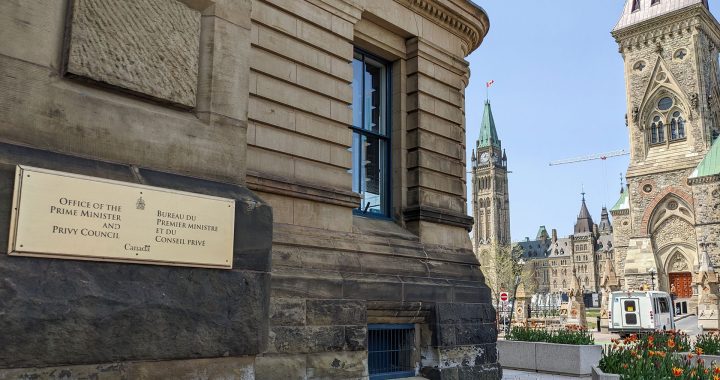
Justice MInister David Lametti speaking to reporters after Friday's meeting. Photo: Fraser Needham/APTN.
Federal Justice Minister David Lametti is appearing to leave all options on the table as he works with provinces and territories to strengthen Canada’s bail system.
“We have a broad consensus on a path forward,” he told reporters, saying reforms will address the challenges posed by repeat violent offenders and those facing firearms or other weapons charges.
“Bail is a constitutional right, but it is not absolute, ” Lametti added.
“Our laws are clear that bail can be denied where there is just cause, when it is necessary for the safety of the public, or to maintain the public’s confidence in the administration of justice.”
Premiers, federal Conservatives and law-enforcement leaders have ramped up pressure on Ottawa since the beginning of the year to make bail more restrictive.
Calls for reform heightened in response to the death of Ontario Provincial Police officer Const. Greg Pierzchala in late December.
Court documents show one of two people facing a first-degree murder charge in his death, Randall McKenzie of Six Nations of the Grand River, was initially denied bail in a separate case involving assault and weapons charges but was released after a review.
In his decision to release McKenzie, the judge relied on Gladue factors.
The documents show a warrant was issued for McKenzie’s arrest after he didn’t show up for a court date in August.
Two chiefs of police who testified before the justice committee earlier this week said the use of Gladue factors at bail hearings is a big part of the problem.
Six Nations Police Chief Darren Montour had this to say about the role Gladue plays in Canada’s bail system: “Gladue factors are outweighing public safety, and going forward I hear that from my community. I hear that from elected council members. They look at Gladue as the get-out-of-jail-free card.”
Brantford Police Chief Robert Davis expressed similar sentiments.
“As we talk about bail reform, I have witnessed first-hand how Gladue considerations, which were initially to be used for sentencing, are now impacting the bail system and to be quite candid are being, I would say, exploited,” he said.
“It’s far too easy for an accused to claim that they have indigenous heritage and thereby be given consideration.”
Both men, who identify as Indigenous, said another problem is that defendants who opt to bring in Gladue factors as part of applying for more lenient bail conditions are not required to provide proof of their Indigeneity to the court.
On Friday, Lametti had this to say when asked if he would consider tightening up how Gladue factors are used at bail hearings.
“They (Gladue factors) were never meant to be something that undermined public safety and the security of the public and I think that’s a message we need to transmit,” he said.
“They are there legitimately to be factored in as one of the causes of commonality or one of the factors that went in and therefore ought to be taken into consideration at decision points such as bail or later sentencing, but they’re not meant to endanger the security of the public and so it is something we will continue to study.”
Lametti referred to Pierzchala’s death as a “catalyst for change.”
He said justice ministers agreed that any measures they pursue in the name of public safety must not undermine efforts to address the overrepresentation of Indigenous and Black people in the criminal justice system.
A January letter from all 13 premiers to the prime minister called for a “reverse onus” system for some offences, which would require a person seeking bail to prove why they should not stay behind bars.
Lametti would not comment on whether those specific provisions are coming but said it is something the government is considering.
Ontario Justice Minister Doug Downey told reporters that it was raised during the meeting, but he was coy about whether any promises had been made.
“We felt heard. There was a lot of collaboration. I look forward to action sooner than later,” he said.
According to the meeting’s agenda, the discussion on targeted bail laws included talks on two subjects: “reverse onus” and “other measures.”
Their agenda also included discussion about enforcement and prosecution, improving bail monitoring and breach enforcement, as well as preventive measures.
Alberta Justice Minister Tyler Shandro said provinces were told changes will be introduced in the next legislative session.
“We don’t have any specific proposals yet,” he said.
Kelvin Goertzen of Manitoba called Lametti’s commitment “an important first step.”
Bronwyn Eyre, Saskatchewan’s justice minister, said there was a constructive attitude at the table.
“It looks as if this will be a positive outcome,” she said. “We’re very, very pleased.”
With files from the Canadian Press









